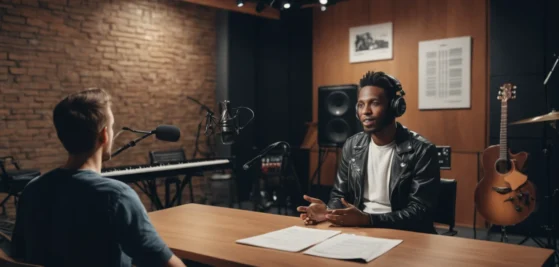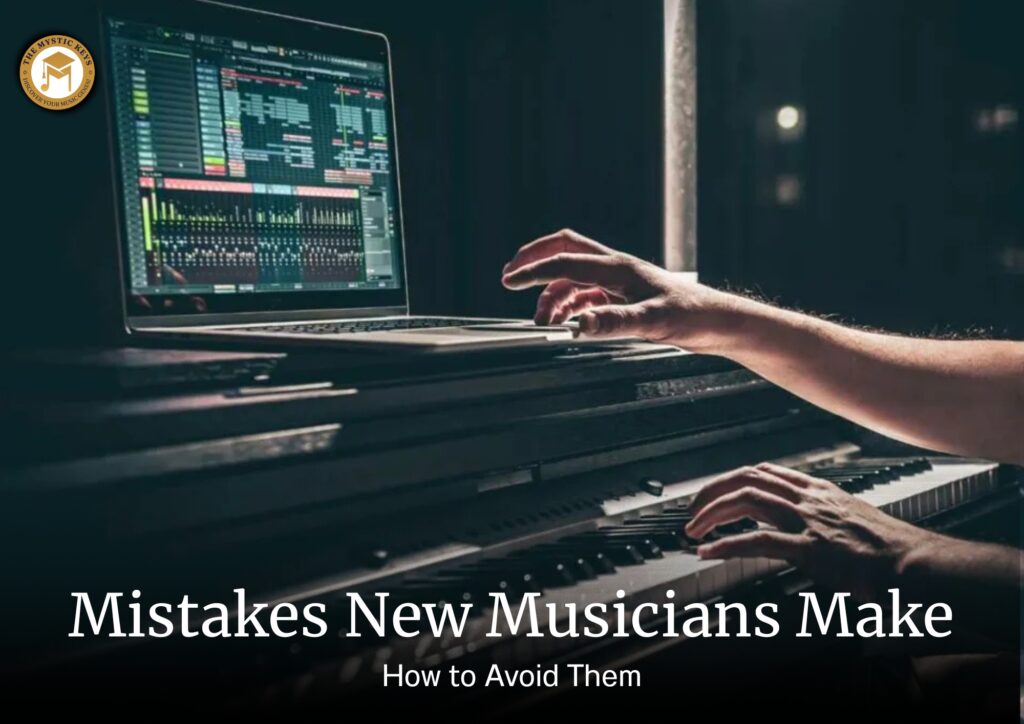Mistakes New Musicians Make and How to Avoid Them
Mistakes New Musicians Make often happen during the most exciting part of the journey. Embarking on a path as a musician is an exhilarating adventure. The thrill of learning your first song, performing for friends, or experimenting with new sounds can be incredibly motivating, and it’s easy to get swept up in the joy of making music. Yet, amid this excitement, the path of learning music is rarely straightforward. Along the way, beginners frequently encounter challenges and pitfalls—mistakes that can quietly slow their progress, sometimes without them even realizing it. Recognizing these common missteps early is crucial, because understanding Mistakes New Musicians Make is the first step toward avoiding them and building a stronger, more confident musical journey.
These challenges usually come in the form of common mistakes—small missteps that might seem insignificant at first but, over time, can make learning more difficult and even discourage aspiring musicians. Recognizing these pitfalls early is crucial because understanding them is the first step toward avoiding them.
The good news is that most of these mistakes are completely avoidable. With awareness, deliberate practice, and a mindful approach, you can overcome obstacles before they become habits. By learning why these mistakes happen and how to correct them, you’ll not only improve faster but also enjoy a smoother, more rewarding musical journey.
In this guide, we’ll walk through five mistakes new musicians frequently make, explore the reasons behind them, and offer practical tips to sidestep them. Whether you’re just starting out or looking to refine your approach, these insights will help you grow more confidently, build stronger skills, and make your musical journey far more enjoyable.

Skipping the Basics | A Common Mistake New Musicians Make
It’s natural to want to play the coolest riffs, solos, or songs you love, but skipping the fundamentals can be a serious roadblock. Many beginners jump straight into complex pieces, thinking that learning them quickly is the key to progress. Unfortunately, without a strong foundation, this approach often leads to frustration.
Why it matters:
Music, like any other skill, is built on a solid base. Techniques such as scales, chord formations, finger placement, and posture might seem repetitive or boring at first, but they are essential. Without mastering these basics, more advanced techniques feel awkward and difficult.
How to avoid it:
Begin every practice session with warm-ups and fundamental exercises. Even 10–15 minutes of scales, chord drills, or vocal exercises can make a huge difference.
Break difficult pieces into smaller, manageable sections. Focus on mastering each section before putting it all together.
Remember, the basics aren’t a step to skip—they’re your musical building blocks. Master them, and the rest will come naturally.
Transition: Once you’ve secured the basics, the next step is to ensure you’re not just playing notes, but playing them in time. This brings us to the next common mistake.

Overlooking Rhythm and Timing | Another Mistake New Musicians Make
Many new musicians get so absorbed in hitting the right notes that they forget rhythm is just as important. Playing the correct notes at the wrong moment can completely change the feel of a piece, making even familiar songs sound off.
Why it matters:
Rhythm is the heartbeat of music. It keeps your playing consistent, helps you sync with other musicians, and ensures that the music is enjoyable to listen to. Without a good sense of timing, even technically perfect playing can fall flat.
How to avoid it:
Always practice with a metronome. It may feel restrictive at first, but it builds precision and internal timing.
Break down rhythms by clapping them first, then gradually integrate them into your instrument practice.
Record yourself regularly. Listening to recordings helps identify timing inconsistencies that you might not notice while playing.
Transition: Mastering rhythm takes consistency, which leads us to one of the biggest challenges beginners face—practice habits.

Inconsistent Practice | One of the Mistakes New Musicians Make
One of the most common mistakes new musicians make is falling into inconsistent practice habits. It’s natural to feel bursts of motivation, diving into long practice sessions when inspiration strikes. However, this excitement often fades, and days can go by without any practice at all. This inconsistency becomes a hidden trap—it slows progress, disrupts muscle memory, and can even shake your confidence as a musician.
Why it matters:
Musical skill develops gradually. Short, daily practice sessions create stronger habits and muscle memory than infrequent, long sessions. Consistency builds discipline, which is essential for long-term growth.
How to avoid it:
Establish a practice routine. Even 20–30 minutes every day is more effective than a few hours once a week.
Divide your practice into sections: warm-ups, technique drills, learning new songs, and creative improvisation.
Maintain a practice journal to track progress. Celebrate small wins—it keeps motivation high and helps you notice improvement over time.
Transition: As you maintain consistent practice, it’s crucial to approach your musical journey with the right mindset. Many beginners struggle with this next challenge.

Comparing Yourself to Others | One of the mental mistakes by new musicians
In today’s world of social media, it’s almost impossible not to notice what others are doing. Seeing professional musicians or even peers posting their performances can be inspiring—but it can also make you feel like you’re falling behind. While drawing motivation from others can be helpful, constantly measuring your progress against theirs can quickly become discouraging and even detrimental to your growth.
Why it matters:
Every musician develops at their own pace. Comparing yourself to others can create frustration, self-doubt, or even lead to giving up. Progress isn’t linear, and what works for one person may not suit your learning style.
How to avoid it:
Set personal goals instead of competing with others. Focus on your growth and achievements.
Celebrate small milestones—mastering a tricky chord, learning a song, or performing confidently in front of friends are all victories.
Use social media for inspiration, not judgment. Follow musicians who motivate you to improve, not discourage you.
Transition: Developing the right mindset and consistency is powerful, but true musicianship also requires training your ear and exploring your creativity—another area beginners often overlook.

Neglecting Ear Training and Creativity |Another Mistake New Musicians Make
While learning from sheet music, tutorials, or tabs can be incredibly helpful for beginners, relying on them exclusively can create a hidden limitation. These tools guide you step by step, but focusing only on replication can restrict your ability to play by ear, improvise, or explore your own creative ideas. Without practicing listening and experimentation, music remains something you perform mechanically rather than something you truly internalize and make your own.
Why it matters:
Ear training allows you to recognize melodies, chords, and harmonies, making your playing more flexible and expressive. Creativity ensures that music remains enjoyable, personal, and unique. Without it, playing can feel mechanical or uninspired.
How to avoid it:
Spend time listening actively. Try to identify chords, notes, and patterns in the songs you love.
Sing or hum melodies before playing them. This strengthens your connection between ear and instrument.
Experiment with improvisation—even small variations on a scale or chord progression build confidence and creativity.
Transition: By addressing these five common mistakes, you set the stage for a more effective and enjoyable musical journey. But let’s tie it all together.

Final Thoughts
Mistakes are a natural and even essential part of learning music. They signal areas for growth and help shape your development as a musician. That said, being aware of common pitfalls and actively avoiding them can significantly accelerate your progress and make your musical journey far more rewarding.
By paying attention to the fundamentals, keeping a steady rhythm, practicing consistently, cultivating the right mindset, and developing both your ear and creativity, you gradually build the skills needed to become a confident, skilled, and expressive musician. Each of these elements reinforces the others, creating a strong foundation that supports everything you play or create.
It’s important to remember that music is not a race. Every note you play, every practice session you complete, and every small improvement contributes to your personal journey. Progress may be gradual, but with patience and persistence, it becomes meaningful. Stay motivated, embrace each step, and most importantly, celebrate the joy and fulfillment that comes from making music.
If you want, I can also craft a version that naturally integrates a promotional call-to-action for your academy, The Mystic Keys, without breaking the flow of the blog. This can make the piece both educational and brand-focused.
Do you want me to do that next?
For more information and exciting resources about learning music, visit our website at The Mystic Keys. For more music content and exciting offers follow us on
Facebook, Instagram, YouTube, LinkedIn, Twitter, Pinterest, and Threads,








